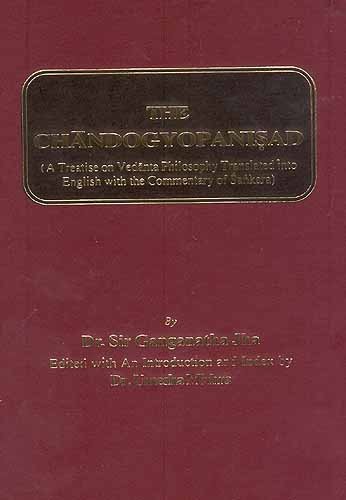Chandogya Upanishad (Shankara Bhashya)
by Ganganatha Jha | 1942 | 149,749 words | ISBN-10: 8170842840 | ISBN-13: 9788170842842
This is the English translation of the Chandogya Upanishad, an ancient philosophical text originally written in Sanksrit and dating to at least the 8th century BCE. Having eight chapters (adhyayas) and many sub-sections (khandas), this text is counted among the largest of it's kind. The Chandogya Upanishad, being connected to the Samaveda, represen...
Section 2.22 (twenty-second khaṇḍa) (five texts)
Upaniṣad text:
‘Of the Sāma, I seek for what is high-sounding and beneficial to cattle’,—this is the song sacred to Agni; the undefined one is sacred to Prajāpati; the well-defined one to Soma; the soft and smooth is sacred to Vāyu; the smooth and forcible to Indra; the heronlike is sacred to Bṛhaspati; the cracked is sacred to Varuṇa;—One should practise all these; he should avoid only the one sacred to Varuṇa.—(1)
Commentary (Śaṅkara Bhāṣya):
In course of the treatment of the Meditation of Sāma, the text is going to expound the rewards accruing to the Udgātṛ priest from the particular forms of singing;—each form is connected with a definite result.—High-sounding—i.e. that whose sound or pitch is particularly high, like the bellowing of the bull,—‘Song’;—this is what is understood, (as qualified by the adjectives, ‘high-sounding’ and the rest);—this song is of the Sāma,—i.e., related to Senary and is beneficial to cattle.—It is sacred to Agni;—i.e. Agni is its Deity;—such is the Udgītha—the song.—‘Such a song I seek for,—ask for’—so thinks a certain sacrificer himself, or his Udgātṛ—Priest.—Undefined—not discernible as resembling a well-known sound;—such sound is sacred to Prajāpati,—Prajāpati is its deity; and as being undefined, this is not a particular form of song. The well-defined—clear—one is sacred to Soma; that is, such song has Soma for its deity—The soft and smooth—song—is sacred to Vāya; i.e. Vāyu is its deity.—The smooth and forcible—song with much effort,—is sacred to Indra.—The herondike,— what is like the sound made by the heron,—is sacred to Bṛhaspati,—related to Bṛhaspati.—The song that is cracked—like the sound made by the cracked bell-metal,—is sacred to Varaṇa.—One should practise all these,—should make use of all these—only he should avoid that which is sacred to Varuṇa.—(1)
Upaniṣad text:
‘May I sing Immortality for the Deities’—thus should one sing;—‘May I sing Satisfaction for the Pitṛs, Hope for Men; Grass and Water for animals, the Heavenly Region for the Sacrificer, Food for myself’—thus reflecting in his mind on all these, one should recite the eulogies with due care.—(2)
Commentary (Śaṅkara Bhāṣya):
‘May I sing—accomplish—Immortality for the Deities May I sing Satisfaction for the Pitṛs; Hope— i. e. Desires, the desired thing—for men;—Grass and Water for animals;—the Heavenly Region for the Sacrificer;—Food for myself;—may I sing all these!—Reflecting on—thinking of—all these in his mind, he should recite the eulogies, with due care,—regarding the pronunciation of vowels, sibilants and consonants and so forth.—(2)
Upaniṣad text:
All vowels are the very selves of Indra; all sibilants, of Prajāpati; all Sparśa consonants, of Death.—If any one should reprove one regarding vowels, he should tell him this—‘I have taken refuge in Indra: He will answer thee’.—(3)
Commentary (Śaṅkara Bhāṣya):
All vowels—the letter ‘a’ and the rest,—are the selves—like the limbs of the body—of Indra,—i.e. of the Life-breath as tending to strength;—all sibilants, the letters ‘śa’, ‘ṣa’, ‘sa’, ‘ha’ and the rest,—are the selves of Prajāpati,—i.e. of Virāṭ or Kaśyapa;—all Sparśa consonants—‘Ka’ and the other consonants,—are the selves of Death.—When the Udgātṛ Priest knows this,—if some one were to reprove him regarding vowels—saying ‘thou hast pronounced this vowel incorrectly’,—he should say in answer—‘I have taken refuge—shelter—in Indra—the Life-breath, the God,—while using the vowels; that same Indra will say all that has to be said; i.e. he will give thee the answer to what thou hast told me’.—(3)
Upaniṣad text:
If any one were to reprove him regarding the sibilants, he should say to him this—‘I have taken
refuge in Prajāpati; he will smash thee’.—If any one were to reprove him regarding the sparśa consonants, he should say to him this—‘I have taken refuge in Death, he will scorch thee.’—(4)
Commentary (Śaṅkara Bhāṣya):
Similarly, if anyone were to reprove him regarding the sibilants, he should say to him I have taken refuge in Prajāpati; He will smash thee,—reduce thee to powder’.—If anyone were to reprove him regarding the sparśa consonants,—he should say to him ‘I have taken refuge in Death, He will scorch thee—reduce thee to ashes’.—(4)
Upaniṣad text:
All vowels should be pronounced with loudness and strength (with the idea that) ‘May I impart strength to Indra’;—all sibilants should be pronounced as well-opened-out, neither swallowed nor thrown out, (with the idea) ‘May I surrender myself to Prajāpati’;— all Sparśa-consonants should be pronounced slowly, without jumbling (with the idea) ‘May I withdraw myself from Death.’—(5)
Commentary (Śaṅkara Bhāṣya):
Inasmuch as the vowels and the letters are the selves of Indra and other Deities,—all Vowels should be pronounced with loudness and strength; the idea in the mind being ‘May I impart strength to Indra’.—Similarly all sibilants should be pronounced as well-opened out,—i.e. with that effort which is technically called ‘Vivṛta’, ‘opened out’,—as neither swallowed—kept within—nor thrown out,—sent out; with the idea ‘May I surrender myself— give myself up—to Prajāpati,—All Sparśa-consonants should be pronounced slowly—gently—without jumbling—without crowding them together—with the idea—‘May I withdraw myself from Death’—gently, as people withdraw boys out of the water.—(5)
End of the Section (22) of Discourse II
